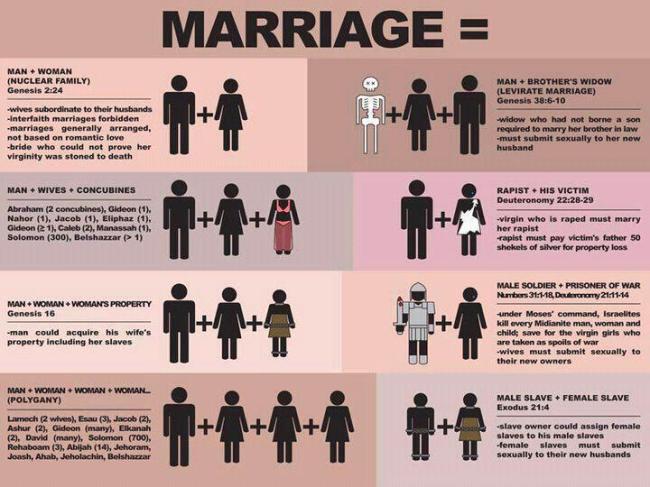
Utah has been in the spotlight recently for its stance against gay marriage. There have been arguments back and forth about definitions of marriage, child-rearing, religious freedom, etc. One article in particular has caught my eye. It’s a secular look at why gay marriage isn’t a good idea. It lists off a bunch of pro-gay-marriage arguments and tries to refute them. Many of the arguments made are the same ones the state of Utah is attempting to make.
This is my dissection of those refutations.
ARGUMENT #1: Marriage has had “consistent elements” throughout history
“All these [historic] variations still embraced the fundamental, unchanging essence of marriage. They still saw it, in general, as a public, lifelong partnership between one man and one woman for the sake of generating and raising children… Yet, even supposing the essence of marriage could change, would that mean it should?… After all, such action may not be ethical or serve the common good.”
MY TAKE: The core ideas behind marriage have changed a LOT and vary from culture to culture.
First of all, the definition of marriage has NOT just been “one woman for one man” (click picture to see larger image):

And it’s not always been about children. Some of the earliest marriages were all about wealth, power and politics:
“The Ancient Greeks also set the very clear pattern of marrying for position, wealth and power. The idea you married because you loved someone was irrelevant – sentimentality or feelings did not come into what was a commercial transaction between families looking to advance or protect their own positions.” (Where Did the Idea of Marriage Come From?)
As for ethics, it seems unethical to hold what seems like a basic right from people and to effectively oppress their expression of love. The Supreme Court has even ruled in 1967 that marriage is “one of the basic civil rights of man.” (Gay Marriage Pro and Con Arguments #14)
ARGUMENT #2: Marriage is about reproduction
“The largest difference is that same-sex couples cannot produce children, nor ensure a child’s basic right to be raised by his mother and father. These facts alone mean we’re talking about two very different types of relationships. It’s wrong, therefore, to assume the state should necessarily treat them as if they were the same.”
MY TAKE: Marriage is about love
Socially, people get married as an expression of love and commitment. Though it is true that oftentimes children come later, that is not always the case and “kids” are not usually the overriding factor in getting married: it’s two people’s intimate feelings towards one another. Simply: Two people in love may have a mutual desire to start a family, but WHY do they marry who they do? They marry out of love. Therefore the defining trait in the relationship is LOVE, not kids.
Legally, no governmental benefits are conferred on married people’s kids through the act of marriage. Kids do not enhance any governmental marriage benefits. The lack thereof does not remove any. Therefore it’s pretty clear to see, in the eyes of government, that kids have nothing to do with marriage.
Either way, socially or legally, marriage has only to do with the two people, not kids or anyone else. Therefore the “differences between the two types of relationships” are non-existent. So why are kids being discussed like it’s some sort of requirement?
“Same-sex marriage advocates may argue that it’s discriminatory to favor heterosexual spouses over homosexual couples. With all of the benefits flowing from marriage, this unfairly endorses one set of relationships over another. But if the state endorsed same-sex marriage, it would then be favoring gay “spouses” over unmarried heterosexual couples. The argument runs both ways and is ultimately self-defeating.”
Of course gay marriage would “favor” gay married couples over unmarried straight couples, just as it would “favor” gay married couples over unmarried gay couples. How is that any different than now — where marriage “favors” straight married couples over straight unmarried couples?
ARGUMENT #3: Straight people are better parents
“The real question here is not whether marriage should be limited, but how. To answer that, we must determine why the government even bothers with marriage. It’s not to validate two people who love each other, nice as that is. It’s because marriage between one man and one woman is likely to result in a family with children. Since the government is deeply interested in the propagation and stabilization of society, it promotes and regulates this specific type of relationship above all others.”
MY TAKE: There’s plenty of evidence that shows gay couples are just as good at raising children
Except that doesn’t appear to be the case (see #2). But even if it were, there is plenty of evidence that shows gay couples are just as family oriented and effective at parenting as straight couples. And there are plenty of gay couples who plan to have kids, whether through adoption or other means.
— American Psychological Association on Children Raised by Gay and Lesbian Parents
— Children raised by gay couples show good progress through school
— Gay Parents Better Than Straight Parents? What Research Says
— Study: Same-sex couples just as good, if not better, at parenting
(See #7 if you feel like there are studies that say otherwise)
ARGUMENT #4: Same sex marriage will destroy marriage and education and limit religious freedom
“[Gay marriage] would weaken marriage. After same-sex marriage was legislated in Spain in 2005, marriage rates plummeted. The same happened in the Netherlands. Redefining marriage obscures its meaning and purpose, thereby discouraging people from taking it seriously.”
MY TAKE: There are other factors for declining marriage rates. Fears about “indoctrination” of children or religious freedom being hampered are overblown or misplaced.
A couple things:
1) Marriage rates in Europe are declining everywhere and have been for awhile.
2) Massachusetts, where gay marriage was legalized in 2004, has seen a 21% decline in divorce. Conversely, Lithuania, where gay-sex marriage is banned, has one of the highest divorce rates in Europe.
“Second, it would affect education and parenting.”
See #3 concerning the argument on parenting.
“After same-sex marriage was legalized in Canada, the Toronto School Board implemented a curriculum promoting homosexuality and denouncing ‘heterosexism.’ They also produced posters titled ‘Love Knows No Gender,’ which depicted both homosexual and polygamous relationships as equivalent to marriage. Despite parents’ objections, the board decreed that they had no right to remove their children from such instruction.”
I think parents should have the right to remove children from social instruction they don’t want taught. But that is a government failing, not a failing of gay marriage.
“Third, redefining marriage would threaten moral and religious liberty. This is already evident in our own country. In Massachusetts and Washington, D.C., for instance, Catholic Charities can no longer provide charitable adoption services based on new definitions of marriage. Elsewhere, Canadian Bishop Frederick Henry was investigated by the Alberta Human Rights Commission for simply explaining the Catholic Church’s teaching on homosexuality in a newspaper column. Examples like this show how redefining marriage threatens religious freedom.”
First of all, at least some of these stories are half-truths. And again, they are great examples for limiting government, however they are not really arguments against same-sex marriage.
ARGUMENT #5: Gay marriage is a slippery slope
“When marriage revolves around procreation, it makes sense to restrict it to one man and one woman. That’s the only relationship capable of producing children. But if we redefine marriage as simply a loving, romantic union between committed adults, what principled reason would we have for rejecting polygamist or polyamorous — that is, multiple-person — relationships as marriages?”
MY TAKE: The slippery slope argument is inconsistent and can be easily dismissed with two simple words: “consenting adults.”
First of all, polygamy is perfectly capable of producing children, and far more efficiently than just one man and one woman. So what “principled reason” is there for not having polygamy if, indeed, marriage is about producing children?
For those that worry gay marriage is a slippery slope, all you need to do is keep the graphic below in mind, along with two words: “consenting adults.”

“This isn’t just scaremongering or a hypothetical slippery slope. These aftereffects have already been observed in countries that have legalized same-sex marriage… Procreation is the main reason civil marriage is limited to two people. When sexual love replaces children as the primary purpose of marriage, restricting it to just two people no longer makes sense.”
That makes no sense. If procreation and children are the main reasons for marriage, then polygamy should be the standard.
“Sexual love” just denotes a love for sex. You can have that with one person or 20 people, whether they be straight, gay, bi, whatever. Gay people aren’t getting married for sex. They, just like plenty of straight people, can do that without a marriage ceremony.
Gay people are getting married because they love one another and want to commit to one another (and we’ve already established that marriage is about love).
ARGUMENT #6: Infertile people and the elderly can marry because they “were designed” for children, but gay people are not
“If marriage is about children, why does the state allow the first group to marry? The reason is that while we know every same-sex couple is infertile, we don’t generally know that about opposite-sex couples…”
MY TAKE: Gay people are “designed” for children — and we’ve already established they make good parents (and marriage is about love, not children, anyway)
For the record, gay people are fertile too. And while they may not reproduce naturally (usually), many gay couples have kids either through adoption or fertilization techniques. There’s plenty of unwanted children out there, and loving gay couples could actually help solve a lot of child-neglect issues we have.
“Some suggest forcing every engaged couple to undergo mandatory fertility testing before marriage. Besides being prohibitively expensive, it would also be an egregious invasion of privacy… Another problem is that infertility is often misdiagnosed. Fertile couples may be wrongly denied marriage under such a scenario…”
An egregious invasion of privacy? Like the invasion of privacy over who gets to share a legally-binding commitment to another person?
It’s true that most elderly couples cannot reproduce, however, these marriages are so rare that it’s simply not worth the effort to restrict them. Also, elderly marriages still feature the right combination of man and woman needed to make children. Thus they provide a healthy model for the rest of society.”
It’s simply not worth the effort to restrict them? If you’re so eager to restrict one group of people over what you believe to be the principles of marriage, I would think you would want to apply that equally to all groups. Effort should take a backseat to keeping up with the principles of marriage — shouldn’t it?
But I see that it’s really about offering a healthy model to the rest of society. Fair enough, except see #3. Also, see #2. It’s clearly not about kids.
ARGUMENT #7: Studies on gay-parent families are skewed, but there is a study that shows gay couples make poor parents
“Several recent studies have put that claim to rest. In June, LSU scholar Loren Marks published a peer-reviewed paper in Social Science Research. It examined the 59 studies that the APA relied on for its briefing. Marks discovered that not one of the studies used a large, random, representative sample of lesbian or gay parents and their children. Several used extremely small “convenience” samples, recruiting participants through advertisements or word of mouth, and many failed to even include a control group. Furthermore, the studies did not track the children over time and were largely based on interviews with parents about the upbringing of their own children — a virtual guarantee of biased results.”
MY TAKE: Both sides have skewed studies
Okay, fair enough. Bad case study. I will admit more comprehensive studies need to be done. If you want to discount everything I said in #3, fine. But before you do…
“Texas sociologist Mark Regnerus released a comprehensive study titled ‘How Different Are the Adult Children of Parents Who Have Same-Sex Relationships?’ His research used a large, random and national sample and its scope was unprecedented among prior work in this field. Contrary to the APA, Regnerus found that for a majority of outcomes, children raised by parents with same-sex relationships drastically underperformed children raised in a household with married, biological parents.”
Wow… talk about a bad case study. There is a HUGE problem: Regnerus compared gay unmarried couples to straight married couples (though I realize that gay married couples could be hard to come by in the U.S.). You either needs to compare gay married couples to straight married couples, or gay unmarried couples to straight unmarried couples. Otherwise, of course the results are going to be skewed.
Even Loren Marks, who is mentioned above, and other social scientists who support Regenerus’ research agree: “it is possible to interpret Regnerus’s findings as evidence for the need for legalized gay marriage, in order to support the social stability of such relationships.”
Also, Regnerus himself says his ‘Family Structures’ study wasn’t about gay parenting.
So if you’re an anti-gay-marriage advocate, and you decide to discount everything I put forth in #3 that says gay parents are just as good as straight parents, make sure you realize there aren’t any studies backing up your side of the argument either. At best, things are a wash.
ARGUMENT #8: There are reasonable anti-gay-marriage people — they are not all homophobic bigots, or even religious
To sum up: There are secular-minded people out there who have reasonable reasons for being opposed to gay marriage (specifically, these ones listed here). Gay marriage advocates love to throw out personal insults and demonize the opposition to distract from the factual case for gay marriage.
MY TAKE: It’s true, not every anti-gay-marriage advocate is a zealot or bigot. And there is a fair amount of name-calling, insults, and hate on both sides. BUT…
I can concede to this point, in as far as I believe not EVERY anti-gay-marriage person is a crazy hatemonger. But I do believe there is a lot of bigotry and homophobia, religious and otherwise in the equation — far more than is not. Not to mention a lot of people who have no problem with gay people but are opposed to gay marriage on the principle that “God says so.”
On top of that, while name-calling and insults certainly can devalue a conversation or debate, it does not devalue the valid points of an argument someone makes.
ARGUMENT #9: The Civil Rights movements and Gay Rights movement are completely different
“The suggestion here is that sex is similar to race, and therefore denying marriage for either reason is wrong. The problem, however, is that interracial marriage and same-sex marriage are significantly different.”
MY TAKE: There ARE similarities between the civil rights movement and gay-rights movement
They are the same in that both have genetic origins and can’t be changed.
“Nothing prevents interracial couples from fulfilling the basic essence of marriage — a public, lifelong relationship ordered toward procreation. Because of this, the anti-miscegenation laws of the 1960s were wrong to discriminate against interracial couples. Yet same-sex couples are not biologically ordered toward procreation and, therefore, cannot fulfill the basic requirements of marriage.”
It IS a civil right (see #1).
It’s not about children (see #2).
And even if it were, see #3.
ARGUMENT #10: Most people don’t approve of gay marriage, and even if they did, that doesn’t make it right
“If the tide is in fact turning, it’s still little more than a ripple. … Most polls show roughly two-thirds of the country wants to keep marriage as it is.”
MY TAKE: Gay marriage hasn’t been “popular” and has been a bitter battle to acceptance. Changing attitudes do not make it a fad.
Ever heard the saying about ripples becoming waves? Most polls now show the majority of Americans approve of same-sex marriage, even if by sometimes slim margins.
“Even if the tides have recently shifted, that does not make arguments in its favor any more persuasive. We don’t look to other moral issues and say, ‘Well, people are eventually going to accept it, so we might as well get in line.’ We shouldn’t do that for same-sex marriage, either.”
No, we shouldn’t. And gay-marriage supporters don’t. We support same-sex marriage because we look at the oppression and hurt being caused by an anti-gay-marriage policy and say “This is morally wrong.” We did not hop on a bandwagon because it was popular (indeed, it hasn’t been popular — and it’s been a bitter battle just to get people talking about it). We’ve dissected all the arguments anti-gay-marriage proponents have given us, from the religious to the secular, and we’ve found they do not hold water. It’s that simple.







